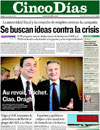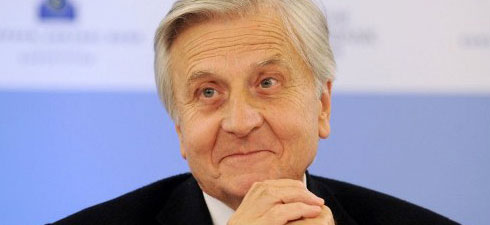“Will Jean-Claude Trichet be remembered as the man who saved the euro or as a central banker who went too far?” As the French man steps down from his post as President of the European Central Bank, which he has occupied since 2003, the question posed by Le Temps has divided opinions in the European press. In The Times, Anatole Kaletsky argues that Trichet, "will leave with euro blood on his hands". For the British columnist, the Frenchman

will be respected for his success at maintaining low inflation and a strong currency throughout his six-year term. But this will pale in comparison with his legacy of nationalist tensions, banking chaos, ECB infighting and public debate in the parliaments of Europe about a euro break-up and sovereign defaults. Unfortunately for Europe and Mr Trichet, his desire to be remembered as an ultra-conservative central banker and his efforts to turn the French-run ECB into an institution that was more Germanic than the old Bundesbank are directly related to the near-collapse of the single currency project in the past two years.
On the contrary, remarks Le Monde in Paris, “the euro is strong, and Jean-Claude Trichet can step down” and “leave with a smile”. The daily highlights the former ECB chief’s conflict with political leaders who “reacted with disdain when he harrassed them with his graphs on competitiveness, arguing that Europe was going to the wall. (...) However, the onset of the financial crisis forced them to change their minds. 'For ten years, he has been saying that Europe was embarked on a road to ruin paved with excessive imbalances. The problem was that no one was listening until 2010', remarks a source close to the French government."

As Le Temps points out: “cracks began to appear with the onset of the Greek crisis and the resulting political drama in the EU”. There is no denying that at the beginning of the financial crisis in August 2007, “the ECB decision to inject 95 billion euros into the European financial system saved the continent’s banks and its economy. And the Frenchman is to be applauded for having realised the danger that has continued to haunt Europe: the danger of the most serious economic crisis since the Second World War.”

However, “the Greek debacle in early 2010, on the other hand, was too much for him… He was vindicated but at the same time deprived of the resources to remedy the situation”, because “neither Berlin nor Paris were ready to allow him take control of the response to the crisis".
In Madrid, Cinco Días argues that “Trichet was more concerned about the survival of the currency under his guidance than by an academic evaluation of his monetary policy.” However, the economic daily points out that “the ECB decision to increase interest rates in July 2008, on the eve the worst recession in 60 years, was a major fiasco.”

The head of the ECB has never regretted a decision that provoked the ire of most of the Eurozone. At the same time, his obsessional assertion of the independence of his institution was perhaps his worst adviser. After 2008, when the crisis crossed the Atlantic to ravage a large part of the European financial sector, Trichet found himself obliged to adopt a more defensive attitude. If it was not for his pragmatism and his political vision he would have been unable to weather the stress and become the only figure Sarkozy and Merkel seem to take into account.
In Germany, Handelsblatt remarks: “When someone is the target of stern criticism from two sides citing opposing arguments, the likelihood is that he or she acted in a just manner. And that is exactly what is happening to Jean-Claude Trichet.” At a time when his record is being evaluated in as he makes way for his Italian successor, Mario Draghi, the business daily points out:

the ECB that Trichet will hand over to Draghi is no longer a clone of the Bundesbank, that is to say an institution uniquely focused on the value of money. Like other central banks, its main brief is to prevent to the collapse of the financial system, even if this does not feature in its official mission statement. Nor can we describe today’s ECB, which in spite of its formal independence remains strongly political, as an Anglo-Saxon style central bank. The fact that it has occupied a middle ground is the reason why it has been attacked on all sides. The creed it has embraced — of preventing collapse but without resorting to false generosity to overcome problems that should be otherwise adressed in the real economy — is a difficult one. And this is the path that Draghi will now have to follow.
Was this article useful? If so we are delighted!
It is freely available because we believe that the right to free and independent information is essential for democracy. But this right is not guaranteed forever, and independence comes at a cost. We need your support in order to continue publishing independent, multilingual news for all Europeans.
Discover our subscription offers and their exclusive benefits and become a member of our community now!












